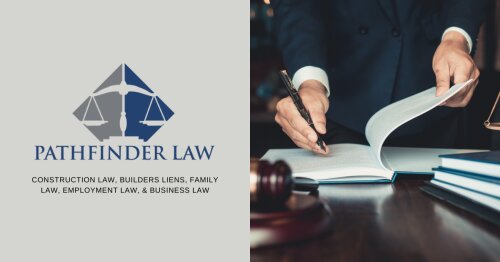Best Commercial Real Estate Lawyers in Abbotsford
Share your needs with us, get contacted by law firms.
Free. Takes 2 min.
Free Guide to Hiring a Real Estate Lawyer
List of the best lawyers in Abbotsford, Canada
About Commercial Real Estate Law in Abbotsford, Canada
Commercial real estate in Abbotsford refers to property used for business purposes, such as offices, retail spaces, warehouses, or industrial facilities. The legal aspects involved are unique and often more complex compared to residential real estate. Navigating commercial real estate in Abbotsford requires an understanding of property law, contract law, zoning regulations, and municipal bylaws. Given Abbotsford's position as a growing economic hub within the Fraser Valley, commercial properties are in continual demand, making local legal expertise crucial when buying, selling, leasing, or developing commercial real estate.
Why You May Need a Lawyer
Engaging with commercial real estate involves significant financial commitments, regulatory compliance, and detailed contractual obligations. Here are some situations where legal assistance is commonly needed:
- Purchasing or selling commercial property, which involves title searches, due diligence, and negotiating sale agreements.
- Leasing office or retail space, where drafting or reviewing lease agreements protects your interests and ensures compliance with local laws.
- Developing property, which often requires zoning and land use approvals from the city or regional district, as well as addressing environmental considerations.
- Subdividing, rezoning, or changing the designated use of a property, processes that involve municipal applications and legal submissions.
- Resolving disputes, whether related to contracts, boundaries, environmental liabilities, or tenant issues.
Having a knowledgeable commercial real estate lawyer ensures your rights are protected, legal risks are minimized, and costly mistakes are avoided.
Local Laws Overview
Abbotsford commercial real estate is governed by a combination of federal, provincial (BC), and municipal laws. Key legal considerations include:
- Municipal Bylaws: Abbotsford has its own zoning and land use bylaws, dictating what types of businesses can operate in specific areas and under what conditions.
- Development Permits: New construction, renovations, or significant changes in property use often require development permits or variances.
- Environmental Regulations: Properties must comply with provincial and federal environmental laws, particularly if contamination or protected lands are involved.
- Commercial Leases: In BC, commercial leases are not standardized, so each agreement will be unique, often requiring careful negotiation and drafting.
- Land Title Registration: Property transactions must be registered at the Land Title Office, ensuring legal ownership and addressing charges, liens, or encumbrances.
- Property Taxes and Assessments: Abbotsford sets its own property tax rates and assessments, impacting costs for commercial property owners and tenants.
Understanding these local legal requirements helps ensure any commercial real estate transaction or project proceeds smoothly.
Frequently Asked Questions
What is the difference between commercial and residential real estate?
Commercial real estate is used for business purposes, like retail, office, and industrial spaces, while residential real estate is intended for people to live in. Commercial properties involve more complex legal, zoning, and financing requirements than residential ones.
What should I look for in a commercial lease agreement?
Review rent structure, lease length, renewal options, permitted uses, maintenance responsibilities, assignment and subletting clauses, and dispute resolution processes. Each term can impact your rights and obligations significantly.
How is commercial property zoned in Abbotsford?
The City of Abbotsford has multiple commercial and industrial zoning categories, each with specific permitted uses and development guidelines. Always verify the zoning of a property through the City's Planning and Development Services department before proceeding.
Are there restrictions on changing the use of a commercial property?
Yes. Changing the use of a commercial property may require a rezoning application, bylaw amendments, or a development or building permit from the Municipality, depending on the nature of the change.
What is the process for buying commercial real estate in Abbotsford?
The process typically includes due diligence (title review, property inspection, zoning compliance), negotiating and drafting a purchase agreement, obtaining financing, and closing the transaction with registration at the Land Title Office.
Are environmental site assessments required for commercial properties?
Often, yes. Environmental site assessments may be necessary when purchasing, selling, or financing commercial properties, especially if there is a risk of contamination. These assessments ensure compliance with provincial and federal environmental laws.
What are common disputes in commercial real estate?
Disputes may arise over lease terms, property boundaries, unpaid rent, maintenance obligations, or environmental contamination. Legal intervention helps resolve these issues efficiently.
Who pays property taxes in a commercial lease?
In many commercial leases (particularly triple net leases), tenants are responsible for paying their share of building property taxes, insurance, and maintenance, in addition to base rent. Always confirm the arrangement in your lease agreement.
Do I need permits to renovate a commercial property?
Yes, most major renovations or changes to a commercial property require permits from the City of Abbotsford, especially if the work affects the building's structure, usage, or external appearance.
How can a lawyer help with due diligence?
A lawyer will review title documents, identify liens or encumbrances, check compliance with zoning laws and bylaws, assess lease agreements, and help gather or assess due diligence materials to protect your interests.
Additional Resources
If you need more information about commercial real estate law in Abbotsford, consider reaching out to these organizations:
- City of Abbotsford Planning and Development Services: For zoning, land use, development permits, and building regulations.
- British Columbia Land Title and Survey Authority: For property registration, title searches, and records.
- BC Assessment Authority: For property assessments and taxation information.
- BC Real Estate Association: Provides resources and educational material on commercial real estate transactions.
- Law Society of British Columbia: To find a qualified commercial real estate lawyer in Abbotsford.
- Fraser Valley Real Estate Board: Offers market insights and referrals to local real estate professionals.
Next Steps
If you are considering buying, selling, leasing, or developing commercial real estate in Abbotsford, taking the following steps can help ensure a smooth process:
- Identify your goals and requirements for the property transaction or development.
- Research the zoning, land use regulations, and any restrictions that apply to the property.
- Engage a reputable commercial real estate lawyer with experience in Abbotsford to guide you through the legal process, conduct due diligence, draft or review contracts, and protect your interests at every stage.
- Consult with the appropriate city departments and other professionals (such as surveyors or environmental consultants) as needed.
- Keep all documentation organized and maintain open communication with your legal and real estate advisors throughout the process.
Taking a proactive, informed approach and seeking qualified legal advice will help you navigate Abbotsford's commercial real estate landscape with confidence.
Lawzana helps you find the best lawyers and law firms in Abbotsford through a curated and pre-screened list of qualified legal professionals. Our platform offers rankings and detailed profiles of attorneys and law firms, allowing you to compare based on practice areas, including Commercial Real Estate, experience, and client feedback.
Each profile includes a description of the firm's areas of practice, client reviews, team members and partners, year of establishment, spoken languages, office locations, contact information, social media presence, and any published articles or resources. Most firms on our platform speak English and are experienced in both local and international legal matters.
Get a quote from top-rated law firms in Abbotsford, Canada — quickly, securely, and without unnecessary hassle.
Disclaimer:
The information provided on this page is for general informational purposes only and does not constitute legal advice. While we strive to ensure the accuracy and relevance of the content, legal information may change over time, and interpretations of the law can vary. You should always consult with a qualified legal professional for advice specific to your situation.
We disclaim all liability for actions taken or not taken based on the content of this page. If you believe any information is incorrect or outdated, please contact us, and we will review and update it where appropriate.












